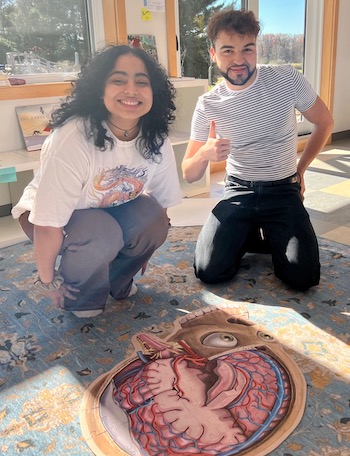Albertus Magnus College Achieves Hispanic Serving Institution Status
Becomes First Catholic College in New England to Meet Federal Designation Requirement

New Haven, Conn., October 18, 2023 – As a Catholic college with mission-centric commitments to equity and opportunity dating back to its founding in 1925 by the Dominican Sisters of Peace, Albertus Magnus College is proud to announce it has achieved Hispanic Serving Institution (HSI) status. HSI is a federal designation for not-for-profit, degree-granting institutions with a full-time equivalent (FTE) undergraduate student enrollment that is at least 25% Hispanic.
“In March 2020, our community endorsed the College’s Albertus 2025: Lighting the Way to a Second Century strategic plan, and in doing so, articulated a commitment to achieve Hispanic Serving Institution status,” said Albertus President Marc M. Camille, Ed.D. “Today, a little more than half way into that plan’s timeline for achievement, we’ve reached this mission centric milestone, with 26% of this fall’s undergraduate FTE enrollment being from Hispanic backgrounds. I am proud to help lead New England’s most diverse Catholic college and its first to achieve HSI status. At Albertus, we emphasize the word ‘service’ in this designation, with a shared goal to support and mentor all of our students in their college education dreams.”
According to the Hispanic Association of Colleges and Universities website, in the 2021-22 academic year there were a total of 572 HSIs across the nation and Puerto Rico, of whom 174 were four-year private non-profits. In Connecticut, the University of Bridgeport was the only private four-year institution with HSI status. Since fall 2017, Albertus Magnus has seen its Hispanic student FTE undergraduate percentage climb from 19% to this fall’s 26%, and the incoming first-year class that enrolled in August was 30% Hispanic, up from 24% a year ago.
“We will embrace this new status and seek to fulfill the service component of being an HSI, by working to retain and graduate these and other underrepresented minority students which is a key part of Albertus’ adaptive strategy in these changing times of higher education” stated Vice President for Academic Affairs and Dean of Faculty Rosa E. Rivera-Hainaj, Ph.D. “What a way to cap-off – and slightly extend – Hispanic Heritage Month.”
About Albertus Magnus College
Albertus Magnus College, founded in 1925, is a coeducational Catholic College in the Dominican tradition. As New England's most diverse Catholic College, Albertus' values and liberal arts-based education is recognized by external rankings such as US News & World Report, Money Magazine, and The Wall Street Journal/Times Higher Education, and has been named a Top 10 Military Friendly School. For seven consecutive years, graduating classes at Albertus have achieved post-graduate employment and graduate school success at a rate of at least 95%. The College has an enrollment of approximately 1,300 students across its traditional undergraduate, accelerated adult undergraduate, and 11 graduate programs. Proud to enroll a student body where more than half of its students come from minority backgrounds with nearly the same percentage of undergraduates receiving Federal Pell Grants and being first generation college goers, Albertus is known for its innovative curricular offerings, recently launching new Bachelor’s degree programs in Game and Computer Arts, General Health Sciences, Interdisciplinary Studies, Project Management, Public Health, Social Media, and Supply Chain Management; among its graduate programs is the State of Connecticut's only Master of Arts in Art Therapy and Counseling program. Just two years from its historic 100th Anniversary Year, the College is implementing its Albertus 2025: Lighting the Way to a Second Century strategic plan, which articulates an inspiring, bold vision to "be a destination liberal arts-based college, distinguished in its interdisciplinary and experiential approach to education, rooted in Dominican values, that prepares students for lifelong civic engagement and success." To learn more, please visit albertus.edu.
